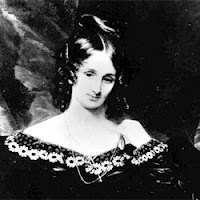While developing the idea for this post, I decided to do a few experiments. They were simple, really: I Googled “Women in Horror”, then “Women in horror writing”. I texted people with the request: “Name all the women horror writers you can think of. Go," and I looked at the best sellers under “Horror” for the Amazon Kindle and Barnes and Noble Nook.
With the first Google search the results I got weren't as bad I was expecting, but they still leave something to strive for: Google gave me links to Women of Horror Month (cool!), and then lists:
One by Maxim, of course. The sexiest women in horror (no, I'm not linking it), including lovely lines such as: “Whenever P.J. appeared in a movie, you could be sure of two things: Gratuitous breastage and a quick, unsavory death.” This, really, encapsulated the primary issue with women in horror movies (which often place women in one of three roles: “hot virgin girl who lives,” “hot promiscuous girl who dies naked,” and “mother who most protect her child and is also probably hot, unless she's the villain”), but it wasn't really the story I was looking for.
Dread Central gets things done better, talking about women in horror movies who are just plain scary... but what's Fangoria's excuse for berating the little-known “Women in Horror Month”, a movement based upon getting more recognition for females in horror, and accusing it of ruining their fun by “politicizing” the genre? Because God only knows horror has never been political. Regardless, it was still all about movies.
Searching “women in horror writing” is a bit more dismal – you get the lists like “26 Women Writers You've Never Heard Of!”, the “shocking” news that some YA author is moving into the “horror” genre, and a derisive blog posing the question: “do we really need more women in horror in the first place?” In the end, it's a pretty sad state, and addresses one huge problem: Most of the time, women horror writers just plain aren't heard, unless they fit a certain archetype – and I don't mean the sexy Goth girl, who might get all the praise among people who read Bloody Disgusting and doesn't really break into the mainstream. I mean the “horror/romance” writer.
 |
| I'm only posting pictures of Mary Shelley for the rest of this post because she deserves it. |
Lets go back to that list of “horror writers you can name off the top of your head.” Did you say: Anne Rice, Laurell K. Hamilton, Charlaine Harris, Mary Shelley, Stephanie Meyer? Or maybe you're a bit more up on things and named Deborah Harkness, Antionette Stockenberg, or Moira Rogers, the current female best sellers on Kindle and Nook. I know that's what people told me. And, really, what's the problem here?
The problem is, except for Mary Shelley, they don't write horror. It's sex, love, and vampires who fall in love with the main character. It might be packaged as containing things that go bump in the night, but that's really just the sexual tension. Worse yet, however, is that even if these books are by women, they contain female protagonists that almost always end up defined by men.
And maybe this wouldn't be a problem (although I'd argue that defining a woman – fictional or not – by the men in her life is always problematic), except when it comes to the “just plain horror” horror stories written by men, you don't get a lot of female protagonists either. Stephen King wrote Carrie, The Girl Who Loved Tom Gordon, Gerald's Game and Lisey's Story, Clive Barker wrote The Hellbound Heart... and? If I started listening popular horror novels with male main characters we would very well be here until Halloween.
 |
| I wasn't joking when I said only Mary Shelley related things from here on out. |
So what is it that seems to cause people to remove women from horror? Maybe it's the derisive remarks many female horror writers receive (Amanda J. Spedding of Screaming Ink has a wonderful article about this, speaking of “The Look” that women get should they say they write horror: read it, it's true). Maybe it's the fact we're supposed to be people that feint at blood, hide from mice, nurture, and not destroy? Or maybe it's just ingrained: I know when I first started looking into publishing my own writing I immediately went to using initials, thinking “who the hell is going to read horror from a girl named Elle?” And I know that I tend to turn away when I see a novel in the horror section written by a women, because of the automatic assumption it's not horror at all (which is, perhaps, sadder than the fact I am normally right in believing that).
In the end, I suppose the real question is, if this is the problem, then what can we do for the solution? In the end, all we (women, horror writers, and any combination of the two) can really do is keep writing, keep striving, and hope that maybe we can sneak in on the coattails of the women whose names are already at the top – even if they aren't writing real horror.
 |
| One more image of Mary Shelley. |

LOVE your Mary Shelley images. And don't ride in on other women's coattails--create your OWN coattails! Er, well . . . you know what I mean. Write strong female protagonists as you would have them, and give the world a *new* Mary Shelley to admire. :-)
ReplyDelete